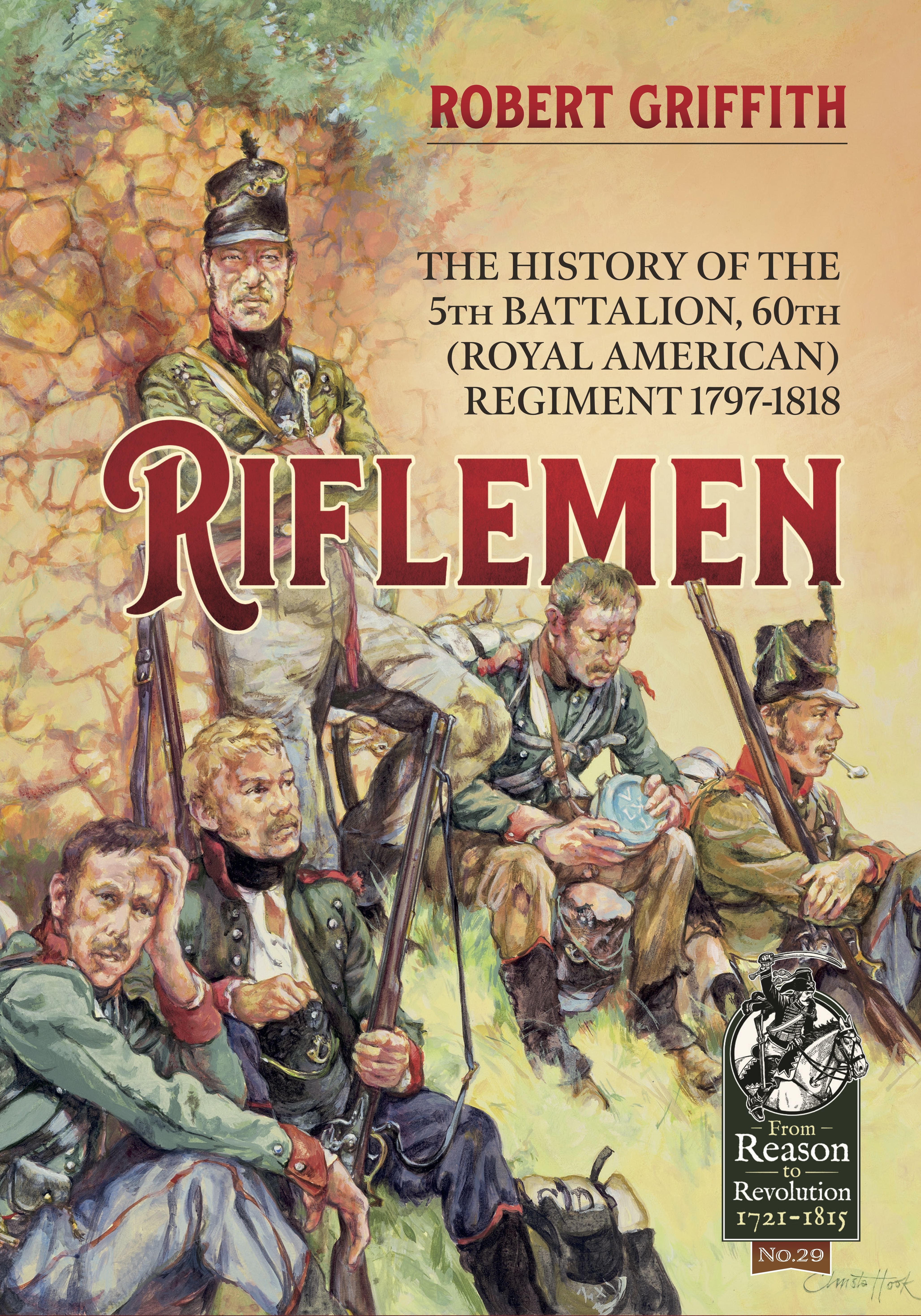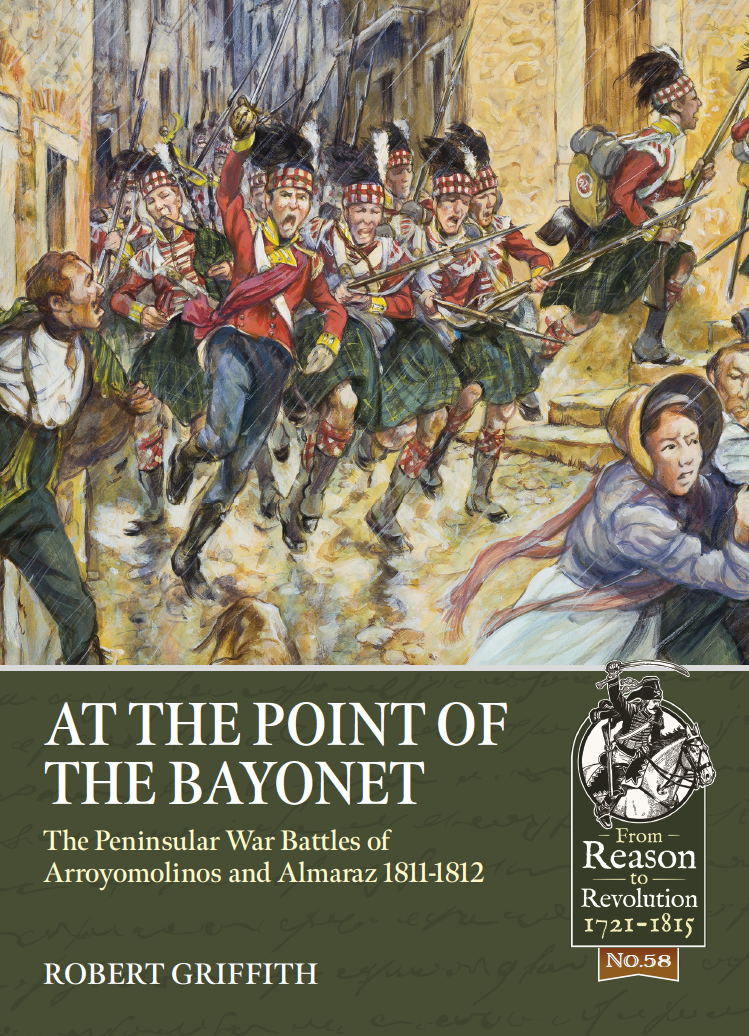
Riflemen: The History of the 5th Battalion of the 60th (Royal American) Regiment – 1797-1818
The 5th Battalion of the 60th (Royal American) Regiment was the first rifle battalion in the regular British Army. Raised in 1797, it marked a significant step in the development of British light infantry and rifle corps. Lieutenant Colonel Francis de Rottenburg, the battalion’s commander for almost 10 years, formulated the first British Army light infantry manual. After serving in Ireland during the 1798 rebellion, in the West Indies, and in the Americas, the battalion rose to fame during the Peninsular War. It was one of only three battalions to be present from the initial landings in Portugal through to the invasion of France, and victory six years later. Divided between the brigades of Wellington’s army to provide specialist rifle and skirmishing capability, the riflemen often formed advance or rear guards, patrols and outposts. Frequently praised by Wellington and his divisional commanders, the battalion won 16 battle honours. Drawing on official records, memoirs, court martial transcripts, inspection reports, and unpublished letters, Riflemen recounts not only the campaigns in which the battalion fought, but also many personal stories of the soldiers who served with it. Riflemen includes tales of murder, promotion from the ranks, desertion, prisoners of war, and small actions that are often overlooked. As the first history of the battalion written in almost 100 years, it sheds new light on a vital component of Wellington’s army and its important place in the history of the British Army.
Published February 2019. To order click here.

At The Point of the Bayonet: The Peninsular War Battles of Arroyomolinos and Almaraz 1811-1812
Rowland Hill was one of the Duke of Wellington’s most trusted subordinates, known for caring deeply for the welfare of his men, but the battles of Arroyomolinos (1811) and Almaraz (1812) show that he was far more than just ‘Daddy Hill’ and a safe pair of hands. He was also a general of considerable skill and daring. At Arroyomolinos he led his troops for days through appalling weather to out-manoeuvre and then decimate an entire French division in a perfectly conceived surprise attack. At Almaraz he advanced far from allied lines to capture and then destroy a vital French bridge, overcoming considerable logistical challenges and substantial defences, and paving the way for Wellington’s victory at Salamanca.
For both actions Hill used the same two British infantry brigades, as well as Portuguese and Spanish units. The relatively small numbers of units involved has enabled the author to give greater focus on the individual regiments and the men who served in them than is often the case with larger battles. He uses memoirs, previously unpublished letters, and official returns and reports to paint a very detailed picture of two small but important battles of the Peninsular War and the men that fought them.
Published April 2021. To order click here.

So Just and Glorious a Cause: Britain and the Liberation of Portugal -Rolica and Vimeiro, 1808
So Just and Glorious a Cause is a highly detailed narrative of Wellington’s first campaign in the Peninsula. Using memoirs, letters, and previously unpublished primary sources, it covers events from Junot’s invasion in late 1807 to the Portuguese revolts in the summer of 1808, and then the sailing of the British expedition and the battles of Roliça and Vimeiro, through to the controversial Convention of Cintra and the liberation of Portugal from the French.
In 1807, with most of Europe under his control, Napoleon looked towards the Iberian Peninsula, hoping to complete his hegemony and extend his reach to South America. He sent one of his most loyal generals, Jean-Andoche Junot, with 25,000 men, to conquer Portugal. The Portuguese had long been caught in the middle between Britain and France. Faced with an invasion he had little hope of preventing, the Prince Regent fled to Brazil, assisted by a Royal Navy squadron, and let his country be occupied.
In the summer of 1808, with the rebellion of the Spanish and Portuguese people spreading across the Peninsula, Britain sent an expedition to liberate Portugal under Sir Arthur Wellesley, the future Duke of Wellington. Still a relatively junior and unknown commander, Wellesley fought an aggressive and successful campaign. He defeated the French first at Roliça and then at Vimeiro but was prevented from sealing his victory by the arrival of more senior officers. The French negotiated generous terms in the Convention of Cintra and were evacuated back to France, ending their occupation of Portugal.
So Just and Glorious a Cause makes extensive use of primary sources from all levels of the French, Portuguese and British forces involved, many of them previously unpublished. The terrible forced marches of the French troops as they crossed the border into Portugal, the frenzied diplomatic efforts in Lisbon, the subsequent brutal occupation, and the Royal Navy blockade are all examined, as well as Vice Admiral Cotton’s efforts to fan the flames of revolt in Portugal and offer support for the uprisings. The French, Portuguese and British forces are analysed in detail, as are the logistical challenges of Wellesley’s campaign. The narratives of the first skirmish at Obidos and then the battles of Roliça and Vimeiro are constructed from first-hand accounts from both sides, and many misconceptions about each action are addressed. Finally, numerous myths surrounding the controversial Convention of Cintra are tackled, including Wellesley’s part in the negotiations.
Published April 2024. To order, click here.